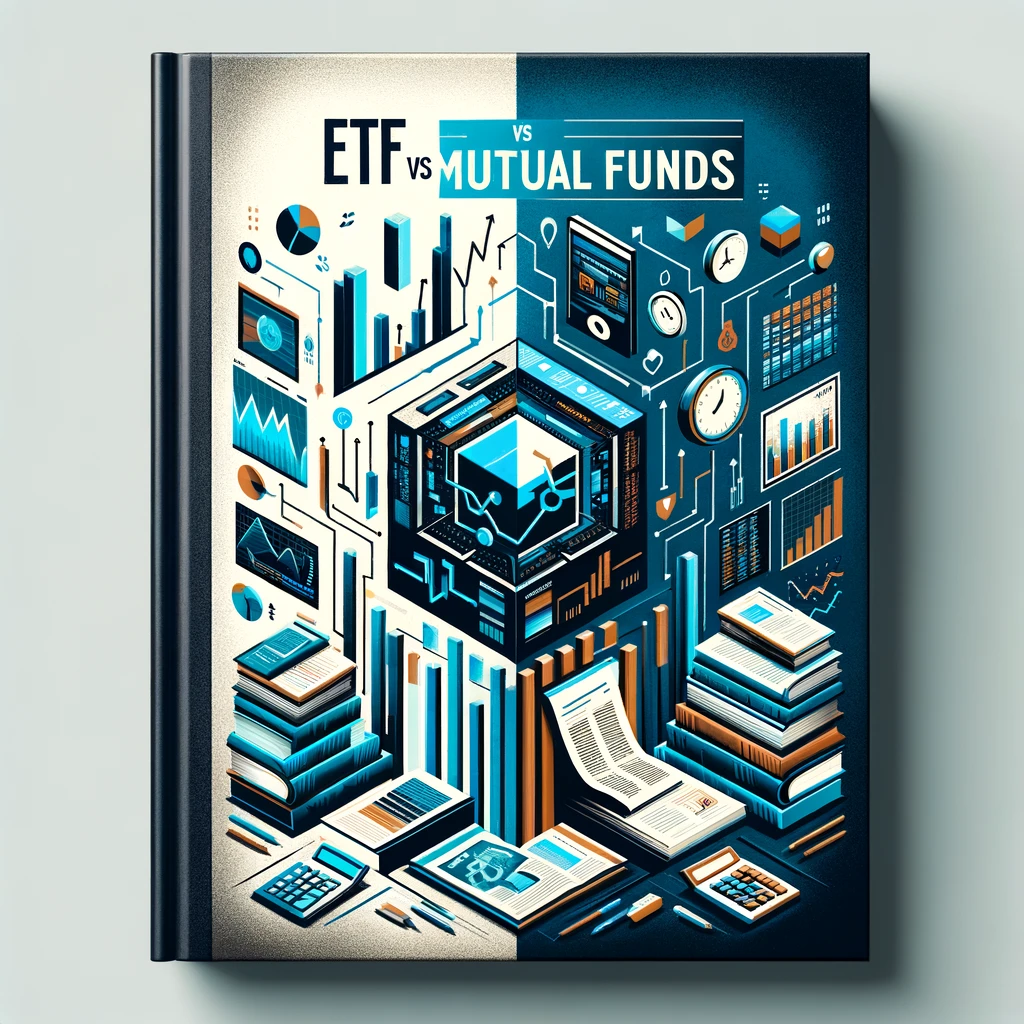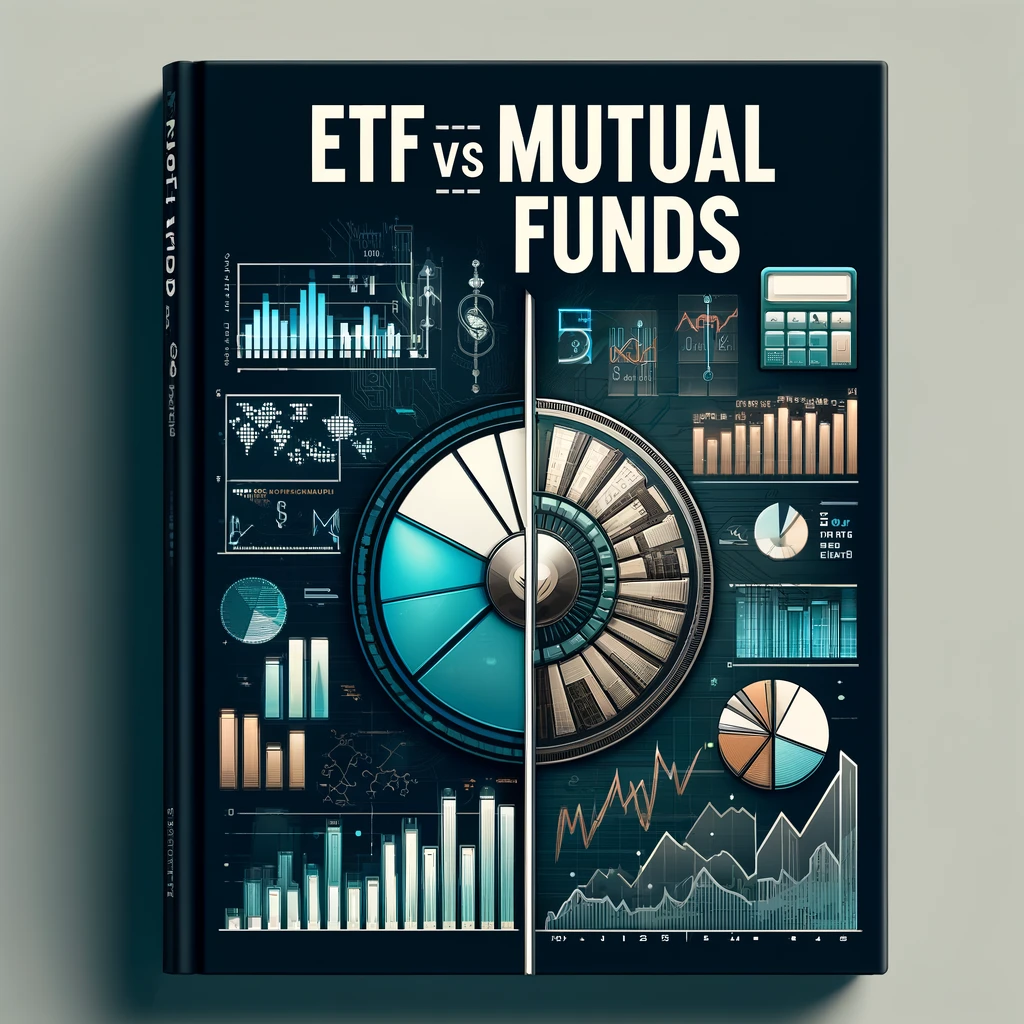Investing in the stock market offers several vehicles, with ETF and Mutual Funds being two of the most popular. While both provide a means to diversify your investment portfolio, they come with distinct features, advantages, and limitations. This comprehensive guide will walk you through the ETF vs Mutual Funds: pros and cons of , aiming to empower you with the knowledge to decide which investment strategy best suits your financial goals.

Understanding ETF
Exchange-Traded Funds (ETFs) are like stocks in that they trade on stock exchanges. However, unlike individual stocks, ETFs bundle together a basket of underlying investments, such as stocks, commodities, or bonds. ETFs typically use a mechanism to ensure their market price stays aligned with the value of their holdings (net asset value), although minor fluctuations can happen.

Know let’s discuss the Pros and Cons of ETF vs Mutual Funds
Pros of ETFs
Flexibility in Trading
ETFs offer the flexibility to buy and sell shares during trading hours at market price, which can be more or less than the net asset value. This real-time trading capability appeals to investors looking for dynamic investment strategies.
Lower Expense Ratios
Generally, ETFs have lower annual fees than mutual funds due to their passive management nature. They typically track a specific index and, as a result, incur lower administrative costs.
Tax Efficiency
ETFs are more tax-efficient than mutual funds. Their unique structure allows investors to buy and sell shares with other investors through the exchange, minimizing the likelihood of incurring capital gains taxes.
Transparency
Most ETFs disclose their holdings daily, providing a clear picture of where your funds are invested, which is a significant transparency advantage for investors.
Cons of ETFs
Trading Costs
While ETFs have lower expense ratios, they incur trading costs such as brokerage fees and bid-ask spreads. Frequent trading can thus increase costs, potentially negating the benefits of lower annual fees.
Price Fluctuations
Like stocks, ETFs trade all day, so their prices fluctuate due to market swings. This volatility can be amplified by factors like investor sentiment and news events.
Potential for Tracking Errors
Despite targeting index returns, ETF management and daily operations cause slight tracking deviations. This is because ETFs incur costs and may not perfectly match the index holdings due to trading throughout the day.
Understanding Mutual Funds: A Snapshot
Mutual funds are a popular investment option for individuals seeking to participate in the financial markets without the burden of actively managing a portfolio themselves. They function like communal investment pools, where money from many investors is combined to create a larger pool of capital. This collective wealth is then used by professional fund managers to purchase a diversified mix of securities.
These securities can include:
- Stocks: Ownership shares in companies, offering the potential for capital appreciation through stock price increases and dividend payouts.
- Bonds: Loans made to governments or corporations, providing a steady stream of income in the form of interest payments.
- Money market instruments: Highly liquid, low-risk investments like short-term government debt, offering a secure place to park cash while earning a small return.
By investing in a variety of asset classes, mutual funds help to spread investment risk. This means that if one type of security performs poorly, the overall impact on the fund’s value is lessened. This diversification is a key advantage of mutual funds compared to investing directly in individual stocks or bonds.
The fund manager plays a crucial role in selecting and managing the portfolio. Their expertise and experience are used to make investment decisions aligned with the fund’s stated objectives. These objectives can range from seeking high capital growth (typically through a higher allocation to stocks) to focusing on steady income generation (with a greater emphasis on bonds).
Ultimately, the goal of a mutual fund is to generate returns for its investors. We can do this in two main ways:
- Capital gains: When the value of the underlying securities in the fund increases, the overall value of the fund (and thus the price of its shares) also rises. Investors can then sell their shares at a profit if they choose.
- Income: Many mutual funds, particularly those with a higher allocation to bonds, distribute a portion of the income earned by the fund’s holdings to investors on a regular basis.

Pros of Mutual Funds
Professional Management
Mutual funds offer the benefit of professional management. Fund managers make all the investment decisions, relieving investors from the need to conduct detailed research and monitoring individual investments.
High Liquidity
While not as instantly liquid as ETFs, mutual funds can be bought or sold at the end of each trading day based on the net asset value calculated at the close of that day.
Diversification
Mutual funds provide an affordable way to diversify. By pooling resources with other investors, you can access a broader range of securities than might be feasible if investing on your own.
Cons of Mutual Funds
Higher Expense Ratios
Consider the cost: Mutual funds often charge higher expense ratios than ETFs. These fees, like a tiny bite taken out of your returns each year, can add up significantly over the long term.
Potentially Lower Performance
Many actively managed funds underperform the market after fees. This is because picking winning stocks consistently is difficult, and fund expenses eat into returns.
Less Control Over Timing of Buy/Sell
Mutual funds trade at the end of each business day, meaning you don’t control the exact buy or sell price. This can be a drawback in volatile markets. If you try to time the market to avoid a downturn, you might miss out on rebounds or buy in at a high point.
Comparative Analysis: ETFs vs Mutual Funds
Understanding the differences between ETFs and Mutual Funds is crucial in making an informed investment decision. Here’s a quick comparative overview:
| Feature | ETFs | Mutual Funds |
| Trading | Throughout the day | End of day based on NAV |
| Management | Generally passive | Active and passive available |
| Expense Ratios | Lower | Higher |
| Tax Efficiency | More tax-efficient | Less tax-efficient |
| Investment Minimum | Usually lower | Can be higher |
Investor Profiles: Who Should Choose What? ETF vs Mutual Funds
ETFs are Ideal for:
- Investors looking for lower cost investments.
- Those who prefer to manage their own investment portfolios actively.
- Investors seeking specific investment sectors or commodities.
Mutual Funds are Ideal for:
- Investors who prefer professional management.
- Those who do not wish to actively manage their investments.
- Investors looking for a “set it and forget it” approach to investing.
The Bottom Line – ETF vs Mutual Funds
Both ETFs and mutual funds have their places in an investment portfolio. Your choice will depend on your investment strategy, financial goals, and risk tolerance. Understanding the pros and cons of each can help you make a more informed decision and potentially lead to better financial outcomes.
You might be interested in reading related https://moneyymagnett.com/investing-in-gold/


Pingback: Hedge Funds